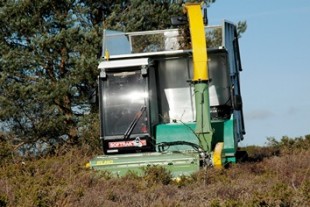
Heathland is the broad name given to a variety of vegetation/habitat types which include:
• heather communities associated with dry and wet heath,
• bracken,
• gorse,
• mire vegetation,
• scrub,
• and grassland.
Conservation of this habitat is a priority in the UK as it has approximately 20% of Europe’s lowland heath.
These heaths support an assemblage of specialised and threatened species of plants and wildlife and are protected by a number of International Conventions, European Directives and UK Legislation.
However like many habitats, management is a challenge and produces large amounts of vegetative biomass.
Over the last few months both AB Systems and AMW-IBERS (DECC project particpants) have been working with the RSPB to use the skills and technology developed through the DECC project for the processing of dry biomass off heathlands. This work aimed to identify the knowledge gaps around the utilisation of heathland biomass for energy products.
A week was spent on the heathland areas of Kent undertaking trials of harvesting; AgBagging, bio-charring and briquetting of materials such as bracken, gorse, scrub and heather. Aberystwyth University coordinated the analysis work and biomass characterisation, taking samples of each of the different habitat types.
In addition to assessing characterisation values, comparisons will be made between the different harvesting techniques, particularly in relation to contamination which the Forestry Commission has experienced as a problem in the past.
As part of the work a demonstration event was held and attended by 51 partcipants, which included representatives from Holland, Belgium and the UK.
Although the DECC project may be reaching its conclusion, it’s satisfying that we are already able to apply the knowledge and experiences learnt to entirely different habitats, which face similar challenges. In managing the future of biomass generated from our nature reserves, the RSPB see this as just the start.